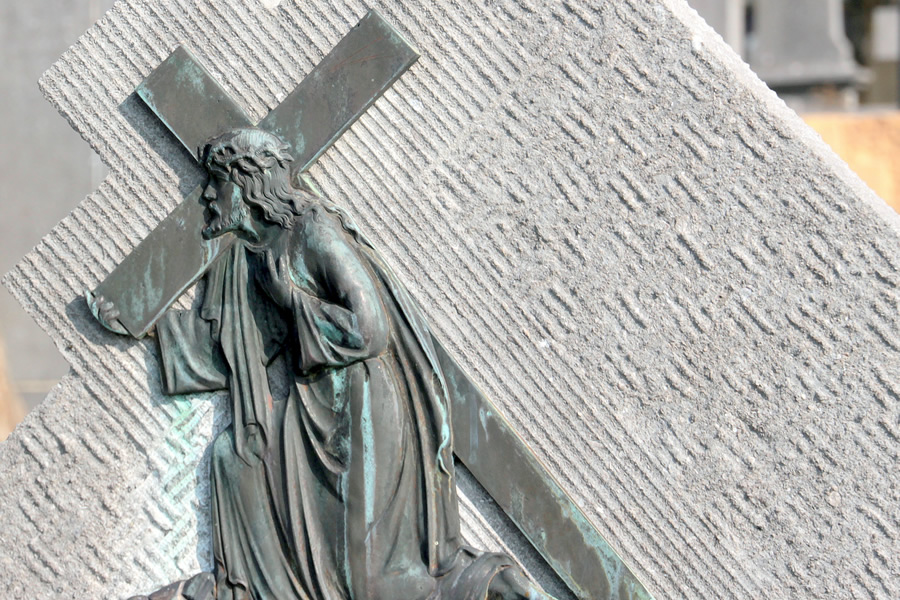
We Know What to Do
by © LPi | 09/29/2019 | Weekly ReflectionIf you saw someone dead come to life tomorrow, what would you change about your life? Would you say "nothing"? That's what Jesus seems to hope. After all, we already know what to do.
In this Sunday's Gospel, a rich man and a poor man pass away, the former to damnation and the latter to peaceful rest alongside the Jewish patriarchs. The rich man asks if the poor man can appear to his brothers and advise them to live a more virtuous life. The parable offers a strong rebuke: "They have Moses and the prophets. Let them listen to them." In other words, they should already know what to do.
We, too, know what to do. More than Moses, Jesus Christ himself has spoken, and continues to speak through his Church. The rich man did not heed the wise words, despite knowing them. If we are convicted against certain Christian teachings in our heart, how much good will miraculous "proofs" do? We know more than the law and the prophets — we know the prophetic law of love proclaimed by Jesus Christ. Are we living like we believe it?
Continue
Compartmentalization or Consistency?
by © LPi | 09/22/2019 | Weekly Reflection"Tax collectors and sinners were all drawing near to listen to Jesus, but the Pharisees and scribes began to complain…"
Compartmentalization or consistency? In this Sunday's Gospel, Jesus tells a strange story of a sneaky, savvy steward that raises questions about our personal virtue. "How much do you owe? Here is your promissory note, write one for eighty." This parable isn't advice for money management. Historically, there were many positions that acted on behalf of their masters regarding money, like customs agents, household stewards, and tax collectors. Often these workers over-charged and skimmed off the top.
Continue
Jesus Welcomes Sinners
by © LPi | 09/15/2019 | Weekly ReflectionTax collectors and sinners were all drawing near to listen to Jesus, but the Pharisees and scribes began to complain…"
In this Sunday's Gospel, we learn the context for the forthcoming parables about the lost and found. A great mixed crowd surrounds Jesus. The religious elite are present, along with all manner of local lowlifes. The Pharisees seem a bit upset that this wasn't the lecture series they were hoping for. Why would Jesus welcome sinners?
Jesus responds as if it's the most obvious thing in the world. "Rejoice with me because I have found my lost sheep … rejoice because I have found the coin that I lost … let us celebrate with a feast, because this son of mine … was lost, and has been found!" Each of the parables features a dramatic example. Of 99 sheep, one has gone astray. Of 10 coins, one has gone missing. The welcomed son has previously been a covetous scoundrel. Jesus' point to the Pharisees is clear. If the Gospel really is "good news," if our faith really has the power to save, why wouldn't we want everyone drawing near? Why wouldn't we do everything in our power to eke out that possibility for every single person, no matter where they have wandered? After all, if this message is not of value to everyone, why is it of value to anyone?
Continue
Following Jesus
09/08/2019 | Weekly ReflectionIt's said that upon reading the Gospels, Gandhi commented that he very much liked Jesus Christ. It was Christ's followers he found troublesome. One wonders who Gandhi had met and if these Christians had truly counted the cost of their faith.
Following Jesus, really following Jesus, is much more challenging than we may think. He emphasizes this with strong language in this Sunday's Gospel. He compares discipleship to the carrying of one's own execution device – "his own cross" – and for the need even to "hate" what could disrupt one's commitment. Some of this is standard hyperbole, exaggeration for effect common to the time period. Some of this should make us wonder how deep our discipleship goes.
Continue
Everyone is Important
by ©LPi | 09/01/2019 | Weekly ReflectionCan you imagine if Jesus threw a party? From the wedding feast at Cana, we know he wouldn’t let the wine run out. From this Sunday’s Gospel, we know there would be quite a lively array of guests! We also knew who the most important people would be — everyone.
Jesus advises throwing a party that turns everything upside down. Everyone should assume they’re the least important attendee, and the guest list shouldn’t include the neighborhood “who’s who.” Rather, we should go looking for “the poor, the crippled, the lame, the blind” and hope they RSVP. Jesus describes a particular posture towards our own hospitality.
Continue